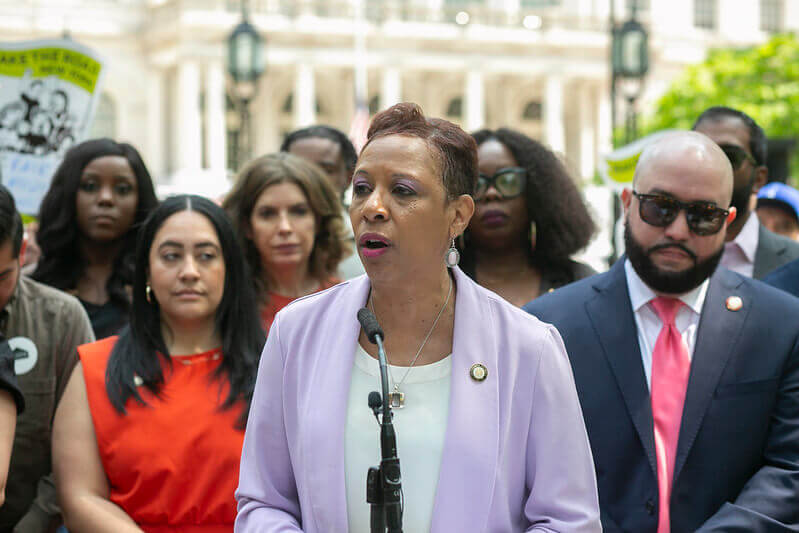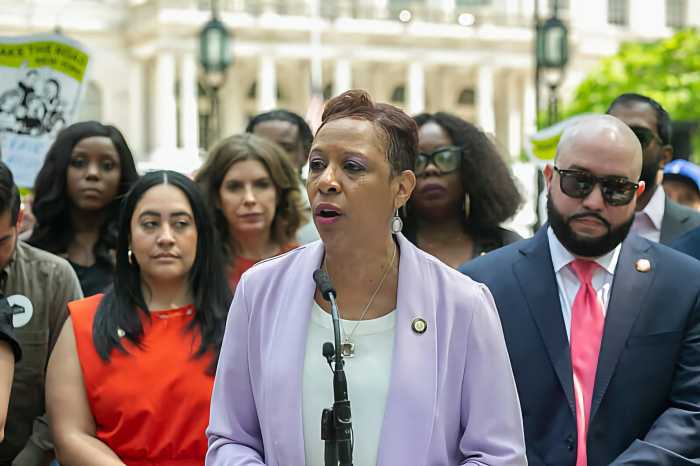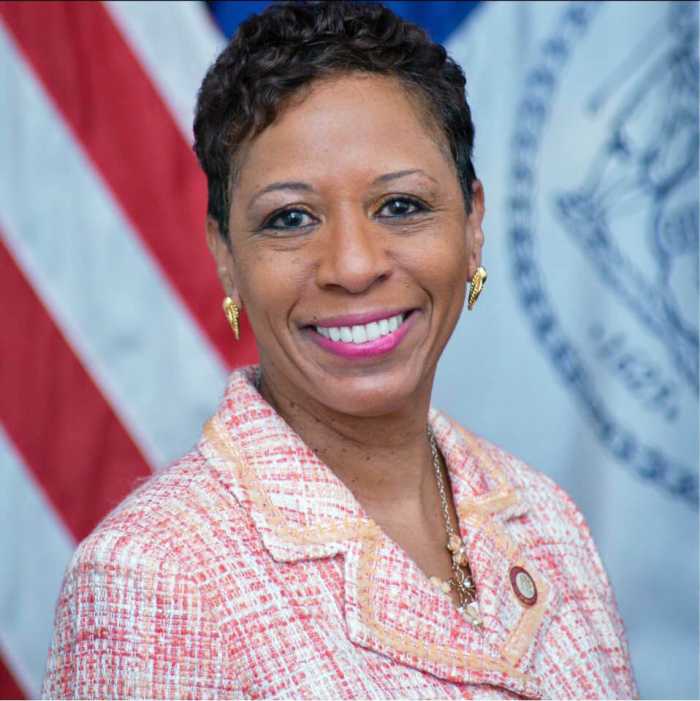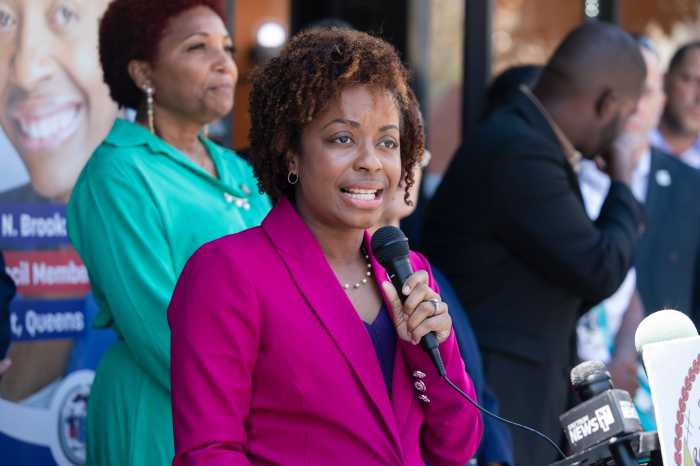In recognition of Black Maternal Health Week, New York City Council Speaker Adrienne Adams, Deputy Speaker Diana Ayala, members of the Council’s Women’s Caucus, maternal health advocates, and healthcare workers gathered on Thursday, April 19, to underscore the continued urgency for sustained action to combat maternal mortality.
They outlined State and City budget priorities to improve maternal health. They highlighted the ongoing work of the Council’s Maternal Health Steering Committee to reduce the severe racial disparities in maternal health outcomes, particularly for Black women and birthing people who are six times more likely to die of pregnancy-related causes than white New Yorkers.
Launched following Speaker Adams’ speech in October 2024 declaring maternal mortality as a public health emergency, the City Council said the Steering Committee has convened healthcare providers, workers, advocates, and elected officials to advance coordinated action steps, including a set of state budget priorities.
“Our women-majority Council has taken charge to fight maternal mortality and champion maternal health – this requires addressing the longstanding economic and racial disparities that make access to health care and stability out-of-reach for many low-income, Black women, and other women of color,“ said Speaker Adams.
“During Black Maternal Health Week, we honor the lives lost due to pregnancy-related causes with our commitment to ending the public health emergency that is maternal mortality,“ she added. “The Maternal Health Steering Committee of stakeholders I convened has been hard at work on this, advocating for state budget priorities that can improve maternal health outcomes.
“My Council colleagues and I have also put forth solutions for the City’s budget that Mayor Adams should agree with us to include so more mothers do not lose their lives,“ Speaker Adams continued. “Through a sustained commitment to overcome the decades of challenges that drive this crisis, we can end maternal mortality and improve health outcomes for Black women and other women of color, who sit at the intersection of our most pressing challenges.
“I thank my Council colleagues and members of the Maternal Health Steering Committee for their continued work to uplift our working families and mothers, without whom there is no life,“ she said.
As we mark the end of Black Maternal Health Week, we are reminded of the stark racial disparities in maternal health outcomes that must be confronted,“ said Deputy Speaker Ayala. “Every loss of life represents a family and a community torn apart from needless and preventable tragedy.
“This crisis is driven by inequities in the social determinants of health, including poverty and a lack of access to quality care, that disproportionately impact low-income communities of color like my district in East Harlem and the South Bronx,“ she added. “As chair of the Council’s Committee on General Welfare and a member of the Council’s Maternal Health Steering Committee, I know ending this public health emergency won’t happen overnight, but our progress must be sustained in the coming months and years to ensure it becomes a reality.”
As part of its work, the Council said the Steering Committee identified three proposals that it has called to be included in the adopted Fiscal Year 2026 New York State budget: S.3359/A.1691 (Sen. Rivera/AM Paulin) – This bill would require Federally Qualified Health Centers (FQHCs), also known as Community Health Centers (CHCs), with Article 28 licensure to be reimbursed in full when conducting services via telehealth, regardless of the location of the patient and provider; S.172/A.84 (Sen. Ramos/AM Solages) – This bill would provide for annual increases of Temporary Disability Insurance (TDI) Benefits from Jan. 1, 2026, through Jan. 1, 2029, to achieve parity with Paid Family Leave (PFL), and Maternal Health Expansion: The City Maternal Health program includes prenatal and postnatal care services such as Maternity Infant Reproduction program, Newborn Home Visiting program, Nurse-Family Partnership, and Universal Home Visiting program.
The City Council has consistently made maternal health a top priority.
In 2022, the Council passed 11 bills to expand maternal health services, including establishing a program to train doulas and provide doula care to residents of marginalized neighborhoods at no cost.
Last year, as part of the third stop of the Council’s Mental Health Roadmap, the Council passed a package of bills aimed at improving maternal mental health support.
The City Council said maternal mental health conditions are the leading cause of maternal mortality in New York City. The legislation includes efforts to create a pilot program establishing postpartum support groups in each borough.
“The Black maternal mortality rates have more than doubled over the last 20 years. And in New York City, Black women are nine times more likely to die during childbirth than their white counterparts. With the leadership of Speaker Adams, my colleagues and I in the City Council are addressing systemic inequities through legislation and budget allocations,“ said Council Member Crystal Hudson, co-chair of the Black, Latino, and Asian Caucus (BLAC), who traces her roots to Jamaica.
“By ensuring the necessary information and care is readily available to mothers in need, we will put an end to this public health crisis,“ added the representative for the 35th Council District in Brooklyn, which includes Crown Heights. “When Black mothers thrive, all mothers thrive.“
“Black and Brown mothers still face disproportionate and discouraging health outcomes, confronting a health system built without their needs in mind,“ said Council Member Carmen De La Rosa, co-chair of the Women’s Caucus. “If we want to keep families in NYC, we have to meet them where they are and make NYC the place to raise a family.
“The Women’s Caucus and women-majority Council, made up of new mothers, working mothers, and grandmothers, has and will continue to support programs and capital improvements to alleviate the historical gaps in our maternal healthcare,“ she added.
“NYC Health + Hospitals appreciated the opportunity to be a part of Council Speaker Adrienne Adams’s Maternal Health Steering Committee,“ said Wendy Wilcox, MD, Chief Women’s Health Officer, NYC Health + Hospitals and member of the Maternal Health Steering Committee.
“With Speaker Adams, we champion providing actionable solutions to address the Black maternal health crisis,“ she added. “As the nation’s largest public health system, we provide care in NYC. No exceptions. We will continue to provide culturally responsive, patient-centered care throughout pregnancy and the postpartum period and partner with other stakeholders to correct the disparity that exists for Black birthing people.”

Photo courtesy Office of New York State Assemblywoman Rodneyse Bichotte-Hermelyn
Assemblymember Rodneyse Bichotte Hermelyn, the Haitian-American chair of the Brooklyn Democratic Party, said Black Maternal Health Week, celebrated annually from April 11 to 17, is “a powerful call to action addressing the alarming disparities in maternal health outcomes for Black women.”
Led by the Black Mamas Matter Alliance, Bichotte Hermelyn, who represents the 42nd Assembly District in Brooklyn, said this year’s theme— “Healing Legacies: Strengthening Black Maternal Health Through Collective Action and Advocacy“ — focuses on “both honoring the past and building a healthier, more equitable future.
“Black Maternal Health Week is more than just a campaign—it’s a movement towards justice, equity, and respect for all Black mothers and birthing people,“ she said.
“We cannot allow the color of a mother’s skin to determine whether she lives or dies during childbirth,“ Bichotte Hermelyn added. “Black mothers deserve the same dignity, care, and outcomes as anyone else.”

























